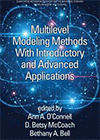
Multilevel Modeling Methods with Introductory and Advanced Applications
Edited by:
Ann A. O'Connell, Ohio State University
D. Betsy McCoach, University of Connecticut
Bethany A. Bell, University of Virginia
A volume in the series: Quantitative Methods in Education and the Behavioral Sciences: Issues, Research, and Teaching. Editor(s): Jeffrey R. Harring, University of Maryland.
Published 2022
Multilevel Modeling Methods with Introductory and Advanced Applications provides a cogent and comprehensive introduction to the area of multilevel modeling for methodological and applied researchers as well as advanced graduate students. The book is designed to be able to serve as a textbook for a one or two semester course in multilevel modeling. The topics of the seventeen chapters range from basic to advanced, yet each chapter is designed to be able to stand alone as an instructional unit on its respective topic, with an emphasis on application and interpretation.
In addition to covering foundational topics on the use of multilevel models for organizational and longitudinal research, the book includes chapters on more advanced extensions and applications, such as cross-classified random effects models, non-linear growth models, mixed effects location scale models, logistic, ordinal, and Poisson models, and multilevel mediation. In addition, the volume includes chapters addressing some of the most important design and analytic issues including missing data, power analyses, causal inference, model fit, and measurement issues. Finally, the volume includes chapters addressing special topics such as using large-scale complex sample datasets, and reporting the results of multilevel designs.
Each chapter contains a section called Try This!, which poses a structured data problem for the reader. We have linked our book to a website (http://modeling.uconn.edu) containing data for the Try This! section, creating an opportunity for readers to learn by doing. The inclusion of the Try This! problems, data, and sample code eases the burden for instructors, who must continually search for class examples and homework problems. In addition, each chapter provides recommendations for additional methodological and applied readings.
CONTENTS
Acknowledgments. Introduction to Multilevel Modeling Methods: Pedagogy and Context, Ann A. O’Connell, D. Betsy McCoach, and Bethany A. Bell. SECTION I: ORGANIZATIONAL DATA. Introduction to Multilevel Models for Organizational Data, Bethany A. Bell and Jason A. Schoeneberger. Evaluation of Model Fit and Adequacy, D. Betsy McCoach, Sarah D. Newton, Anthony J. Gambino. Causal Inference in Multilevel Settings, Chris Rhoads and Eva Yujia Li. Statistical Power for Linear Multilevel Models, Jessaca Spybrook, Benjamin M. Kelcey, and Nianbo Dong. Cross-Classified Random-Effects Models, Audrey J. Leroux and S. Natasha Beretvas. Multilevel Logistic and Ordinal Models, Ann A. O’Connell, Meng-Ting Lo, Jessica Goldstein, H. Jane Rogers, and C.-Y. Joanne Peng. Single and Multilevel Models for Counts, Ann A. O’Connell, Nivedita Bhaktha, and Jing Zhang. SECTION II: LONGITUDINAL DATA. Individual Growth Curve Models for Longitudinal Data, D. Betsy McCoach, Bethany A. Bell, and Aarti P. Bellara. Modeling Nonlinear Longitudinal Change With Mixed Effects Models, Jeffrey R. Harring and Shelley A. Blozis. Within-Subject Residual Variance–Covariance Structures in Longitudinal Data Analysis, Minjung Kim, Hsien-Yuan Hsu, and Oi-man Kwok. Modeling Variation in Intensive Longitudinal Data, Donald Hedeker and Robin J. Mermelstein. SECTION III: DESIGN AND SPECIAL ISSUES. Using Large-Scale Complex Sample Datasets in Multilevel Modeling, Laura M. Stapleton and Scott L. Thomas. Common Measurement Issues in a Multilevel Framework, Brian F. French, W. Holmes Finch, and Thao Vo. Missing Data Handling for Multilevel Data, Craig K. Enders and Timothy Hayes. Multilevel Mediation Analysis, Nicholas J. Rockwood and Andrew F. Hayes. Reporting Results of Multilevel Designs, John M Ferron, Yan Wang, Zhiyao Yi, Yue Yin, Eunsook Kim, and Robert F. Dedrick. About the Contributors.
-
Paperback978-1-64802-871-7
Web price: $62.04 (Reg. 72.99)
-
Hardcover978-1-64802-872-4
Web price: $89.24 (Reg. 104.99)
- eBook978-1-64802-873-1

- EDU029010 - EDUCATION: TEACHING METHODS & MATERIALS: Mathematics
- EDU030000 - EDUCATION: Testing & Measurement
- EDU011000 - EDUCATION: Evaluation & Assessment
-
 A Practical Guide to Exemplary Professional Development Schools
A Practical Guide to Exemplary Professional Development Schools
-
 Diversity as Strategic Opportunity
Exploring New Paths to Good Administration
Diversity as Strategic Opportunity
Exploring New Paths to Good Administration
-
 Multilevel Modeling of Educational Data
Multilevel Modeling of Educational Data
-
 Real Data Analysis
Real Data Analysis
-
 Structural Equation Modeling
A Second Course (2nd ed.)
Structural Equation Modeling
A Second Course (2nd ed.)
-
 Structural Equation Modeling
A Second Course
Structural Equation Modeling
A Second Course
-
 The Undivided Life
Faculty of Color Bringing Our Whole Selves to the Academy
The Undivided Life
Faculty of Color Bringing Our Whole Selves to the Academy

